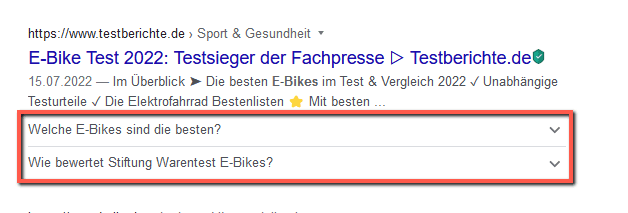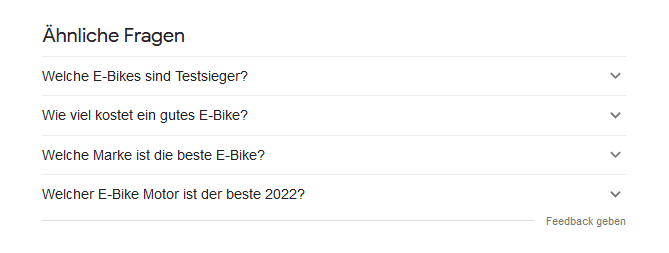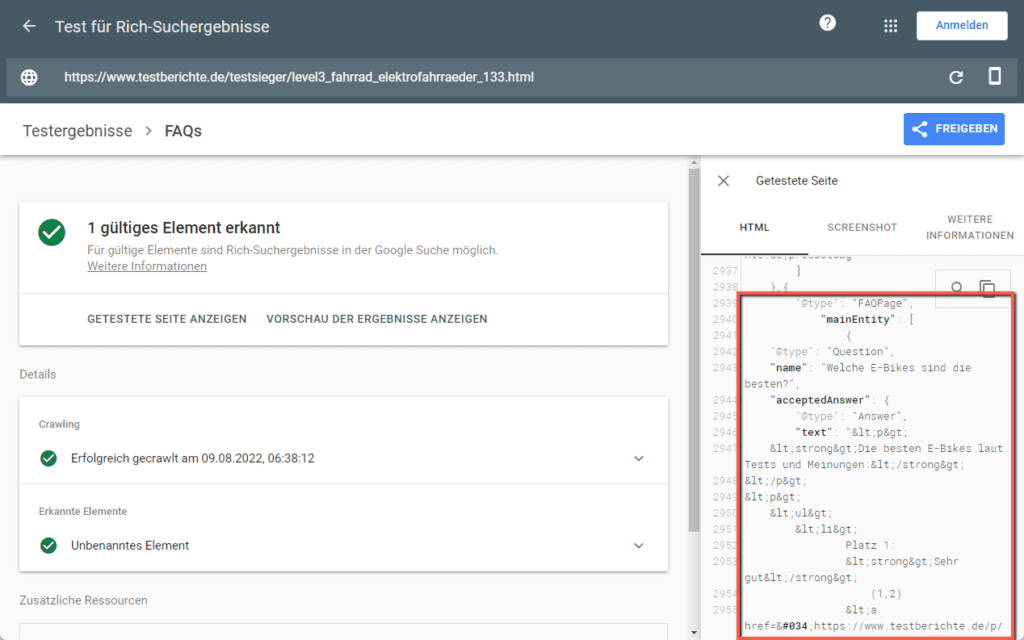
Blog Post
SEO

Nadine
Wolff
published on:
09.08.2022
Create FAQs and improve the website’s SEO rankings
Table of Contents
Including FAQs on a website has many advantages. For example, they can reduce the load on customer service, increase conversions, or improve visibility in unpaid search results. This article explains in detail the various ways to create an FAQ page and how to optimize it for SEO.
What is meant by FAQ?
FAQ stands for “frequently asked questions” and can be translated as “commonly asked questions.” Specifically, this involves collecting the most important information on a topic and presenting it in the form of questions. These can include frequently occurring issues or the most frequently asked questions. FAQs are widespread in the software sector or other technical areas, but they can be useful for any topic and industry.
One of the goals of FAQs is to answer questions from potential buyers easily, thereby reducing the burden on customer service. If a purchase has already been made and problems arise, the FAQ section prevents customer service from having to deal with the same easily answered questions. A well-prepared FAQ section benefits both users and companies.
How do FAQs benefit SEO?
First: Any type of relevant optimized content is positive for search engine optimization. With FAQs, you have the opportunity to cover composite keywords and phrases (long tail keywords) that a product page, for instance, does not answer. You will be found for questions that users have about a topic, such as your products or services.
At the same time, you increase your authority in your field in Google's assessment because you provide a lot of relevant high-quality content. Greater authority means higher trust and thus a better chance of being found in unpaid search results even for competitive terms.
Another SEO advantage is the chance of appearing as Rich Snippets on search results pages (SERPs).
In the example of e-bikes, you see in the result below that two questions are displayed directly in the search result for the testberichte.de website. This gives the website more attention in the SERPs than results without this enhancement.

Screenshot from the SERPs - Example E-Bikes
What are the ways to integrate FAQs into a website?
Depending on the purpose of the FAQs, different solutions offer themselves for integrating them on the website. Below are the most important ones and their advantages and disadvantages.
Dedicated FAQ Page
The first option is to create a single long FAQ page that lists all important questions. For better overview, an accordion element is often used in the layout, allowing users to expand and collapse answers to individual questions.
Advantages
Easy to set up and maintain
Even simple questions that can be answered in one sentence are no problem for SEO
Disadvantages
Rarely ranks for (competitive) terms, as different topics are addressed on one page, and thus the focus is missing
Fewer opportunities for good internal linking between individual questions
SEO-friendly setup
Each question as a sub-headline
Use correct headline structure
If technically possible, table of contents at the top of the page with jump marks to individual questions
Where appropriate, link relevant products or services from FAQ texts
Implementation of structured data (see below)
FAQ Section on the Page
An alternative with more SEO potential is a standalone FAQ section on the website instead of a single page. There is an overview page with all questions that link to subpages with the answers to the questions. If there are a large number of questions, they can be thematically categorized for better clarity. In the e-bike example, categories could include: General Questions, Brands, Models, Batteries, Maintenance, and Repair.
Advantages
Higher chance of being found for keywords
More targeted optimization for keywords is possible, as longer texts are created and can be optimized for a larger number of keywords.
Better usability, as no navigation on a long page is necessary
Disadvantages
More maintenance required, as many individual pages are created
Individual FAQs require more content to avoid creating “thin content.”
SEO-friendly setup
Overview page with teasers and links to detailed FAQ pages with individual questions
Detail pages with correct headline structure
Minimum amount of content (if there are still questions with very short answers, it may be wise to exclude them from indexing)
Cross-linking between similar FAQs
Links to relevant product pages or services
Implementation of structured data (see below)
FAQ Section on Service Pages or Product Pages
Product or service pages also benefit from an FAQ section. Especially if there are very specific questions about a particular product, they are well placed on the product page. They can help reduce reservations against a purchase or answer questions that would otherwise occupy customer service. In the worst case, users might bounce off if they do not find an answer to their question and purchase the product from a competitor.
Advantages
Expands content on these pages with useful and relevant phrases and terms
Questions can appear as extensions in search results (Rich Snippets) for product pages or services, gaining more attention.
Disadvantages
For high-competition keyword combinations that individual FAQs are optimized for, there is a significantly lower chance of ranking than if these were created as standalone pages.
SEO-friendly setup
FAQ section with heading
Individual questions as headlines (observe correct headline structure)
Implementation of structured data (see below)
FAQs as Blog Posts
If the CMS does not allow a standalone FAQ area, one option is to incorporate FAQs in the form of blog posts. Each blog post answers a question for which keywords with sufficient search volume have been defined.
Advantages
Easy maintenance
Good chance of being found
Disadvantages
Individual FAQs require a minimum amount of content
They may get lost on the website (worse usability)
SEO-friendly setup
Correct headline structure
Minimum amount of content
Cross-linking between similar FAQs/blog posts
Links to relevant product pages or services
To prominently place FAQs on the website, you could create FAQ as a category in the blog and link this category page.
Implementation of structured data (see below)
Optimizing FAQs for Search Engines - 3 Additional Tips
Above, guidelines for SEO-friendly setup of the various types of FAQ pages were already given. We want to provide you with three additional tips to take your FAQ SEO to the next level.
Selecting Appropriate Questions
If you have set up your FAQ section so that each question has its own page, we recommend conducting a keyword analysis to research subtopics or questions that are of interest. If you have already collected questions you know to be relevant from practice, such as those your customer service regularly receives, keyword analysis can help you describe these questions with the words your target audience uses. The goal is to identify terms or phrases that are frequently searched for.
You can use these sources for your keyword analysis and question identification:
Paid keyword tools
Free keyword tools (such as answerthepublic)
Google search results: Google suggestions, questions in the Google search
SEO tools displaying competitor keywords
Your own analysis tools, especially Google Search Console, which shows you which topics and questions you already have some visibility for.

Screenshot from the SERPs - Example E-Bikes
Using the example “E-Bikes”, you could identify this incomplete list of general topics and questions:
Which e-bike is recommended? (Question in Google search results)
Which e-bike motor is the best in 2022? (Question in Google search results)
How much does a good e-bike cost? (Question in Google search results)
Which e-bike suits me? (Keyword tool in SEMrush)
How long does an e-bike battery last? (Keyword tool in SEMrush)
Who repairs e-bikes? (answerthepublic)
How to charge an e-bike battery? (answerthepublic)
Use FAQ Markups
If your CMS allows it, it is recommended to integrate structured data to help Google interpret and classify content. In the case of FAQs, the FAQPage markup ensures that Google recognizes what a question is and what an answer is, allowing this content to be classified as an FAQ.
You can find detailed explanations at Google as well as on the schema.org page for FAQPage and QAPage.
Structured data can be verified using Google's “Rich Results Test” tool. The tool shows which markups have been incorporated and whether they contain errors.
In the example of the testberichte.de page, we see in the Google tool that the FAQ markup was used, which generates the enhanced search result:

Optimize Internal Linking
One of the greatest advantages of an FAQ section on the website, besides generating relevant content, is the opportunity to improve internal linking. Linking related pages within your website strengthens the linked page and also helps users find new content and stay on your website longer.
Therefore, consider with each individual question whether there are meaningful products, services, blog posts, other FAQs, or other pages that you can link to from the text. To achieve good internal linking, use a descriptive link text instead of a vague text like “read more here.”
To identify appropriate links, it is also wise to ask after creating the FAQ text: what is the most sensible next step for users who ask this question and have read this content? Is it a product page? Do more questions usually follow? Is the answer to the question to use your service?
Content Optimization from FAQ to Blog with the internetwarriors
Do you want to improve your organic visibility with optimized content? Our experienced SEO team knows all the tricks and tools to be found better on Google. We analyze your content, assist you with optimization, or provide you with relevant optimized content for your website or online shop. This could be FAQ texts, but also product descriptions or blog posts. Contact us, and we will be happy to provide you with a non-binding, customized offer!
Did you enjoy the blog? Share it now!
AUTHOR

Nadine
Wolff
As a long-time expert in SEO (and web analytics), Nadine Wolff has been working with internetwarriors since 2015. She leads the SEO & Web Analytics team and is passionate about all the (sometimes quirky) innovations from Google and the other major search engines. In the SEO field, Nadine has published articles in Website Boosting and looks forward to professional workshops and sustainable organic exchanges.


